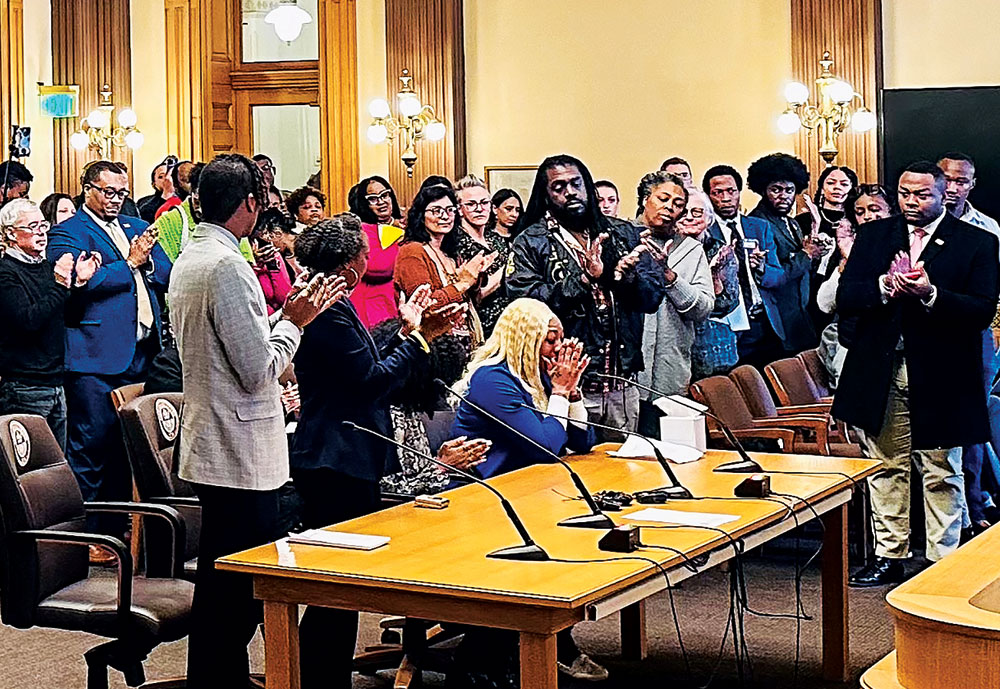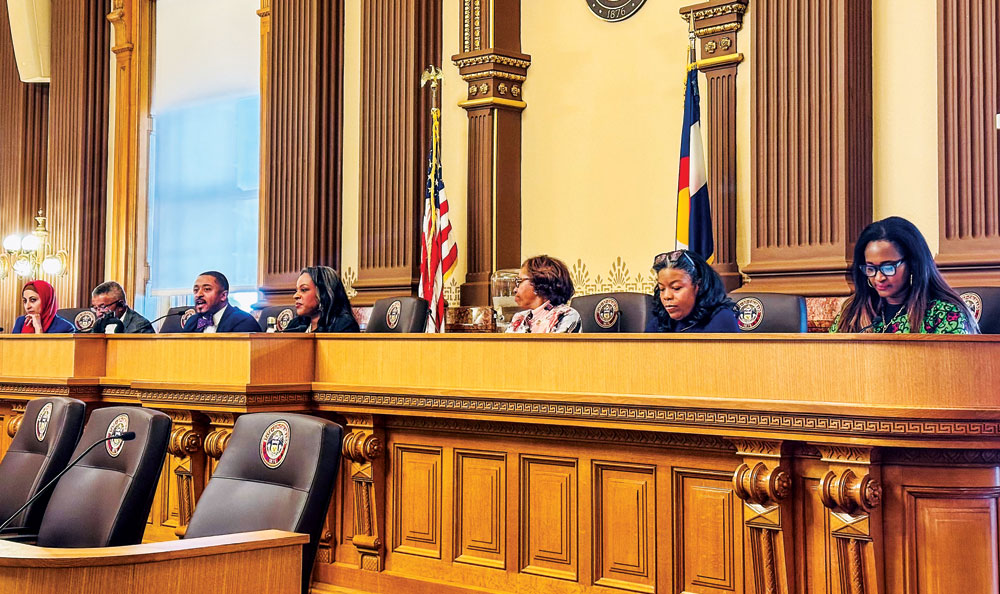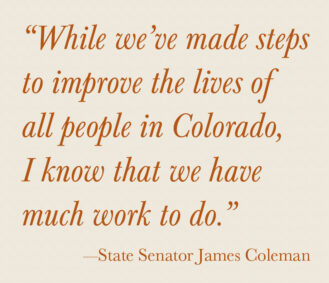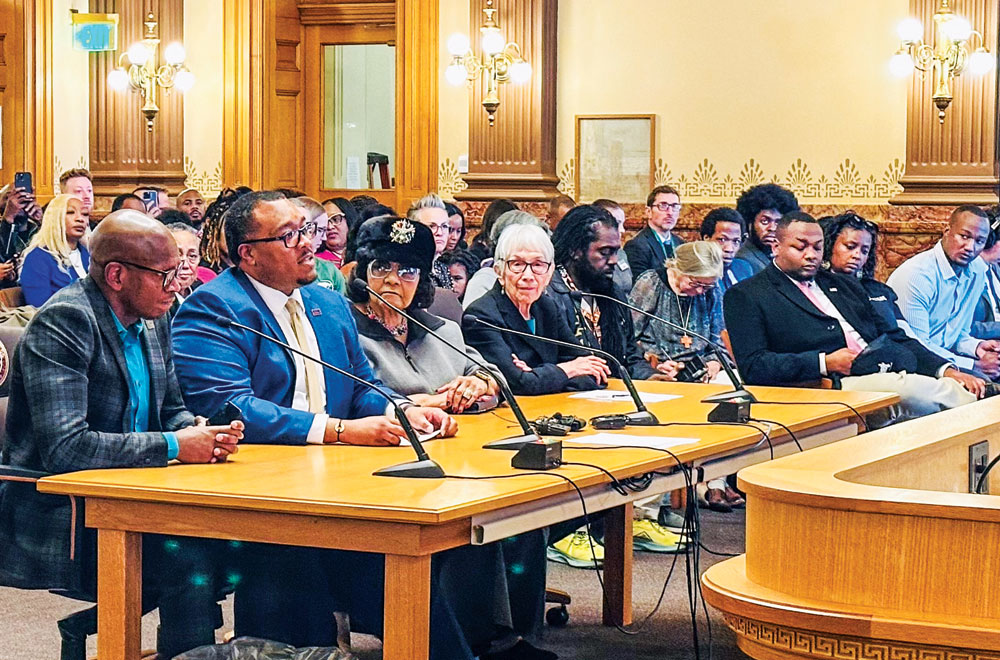
Audience members rose to applaud Sheriece Hurd following her emotional testimony in a public hearing before the Congressional Black Caucus at the Colorado State Capitol. Describing how she had been wrongfully incarcerated and mistreated by the justice system, she spoke in strong support of proposed legislation to study systemic racism in Colorado.
On the first day of February and the start of Black History Month, dozens of Black Coloradans went to the state capitol building to describe how racism and discrimination had impacted their lives. Sil Morgan-Smith talked about redlining by realtors and other forms of housing discrimination. Sheriece Hurd described how she was mistreated by the criminal justice system. Michael Atkins spoke about how even after 40 years of involvement with Denver Public Schools—first as a student, then janitor, then teacher, then principal, and now director of Black student assessment—he sees that the education system “still grapples with the persistent challenge of closing the access gaps for most of our Black students.”

Members of the largest Congressional Black Caucus in Colorado history convened a public hearing about racial inequities in housing, healthcare, education, employment, and the criminal justice system. They support a racial equity study bill to uncover the root causes of persistent discrimination and to generate ideas for how to eradicate it.
The public hearing was hosted by the Congressional Black Caucus to show support for a bill that supporters say will help uncover the systemic inequities that Black citizens face. The “Racial Equity Study” bill would create an independent task force to study the lingering impacts from slavery, systemic racism, and the degree to which the state government perpetuates discrimination.
 “While we’ve made steps to improve the lives of all people in Colorado, I know that we have much work to do,” said Sen. James Coleman, one of the sponsors of the bill. “By focusing on healthcare, housing, education, the criminal justice system, and the economy, this study will provide crucial insights, allowing us to quantify and qualify the pervasive inequities that persist.”
“While we’ve made steps to improve the lives of all people in Colorado, I know that we have much work to do,” said Sen. James Coleman, one of the sponsors of the bill. “By focusing on healthcare, housing, education, the criminal justice system, and the economy, this study will provide crucial insights, allowing us to quantify and qualify the pervasive inequities that persist.”
Although Colorado was not a slave state, the legislation notes that “The Ku Klux Klan wielded great influence and power in Denver and in state politics in the 1920s” which “transpired to policies, systems, and practices adopted at the state level.” The legislation goes on to describe how those systems led to racial inequities in homeownership, health outcomes, education, access to jobs, and the criminal justice system.

Michael Atkins, Javon Brame, Si Morgan-Smith, and Anna Jo Garcia Haynes (left to right) were among several panels of witnesses who talked about the systemic racism they have experienced living in Denver.
Rep. Leslie Herod, another sponsor of the bill, highlighted that imbalance in the justice system when she spoke at the public hearing. “While Black Coloradans make up five percent of state residents, we constitute 17 percent of people in jail and 18 percent in prison. The criminal justice system has been set up to house Black people.”
Herod praised members of the Black community who showed up to tell their stories and said the legislation was drafted in response to community concerns about why these negative trends hadn’t been reversed.
The study will be conducted by History Colorado, the state’s historical society, in coordination with a Black equity steering committee, which will be made up of current and former lawmakers, community leaders, and other experts. It is expected to take two and a half years.
In an interview with Front Porch, Herod pushed back when asked whether a study is really needed when so many statistics about racial disparities are already known. “Quite frankly, we haven’t had a historical study like this—sanctioned by the State, specifically looking at inequities created by government to Black people. And then looking at what those remedies should be.” She noted that over the years, the government has created some programs that tried to reverse the trends. “Some have had some success, and some of them had no success. But until we get at the root causes and really understand as a collective the basis for the discrimination, I don’t think we’ll be as successful as we want to be.”
Herod says she feels quite confident that the bill will pass the legislature and be signed into law, despite opposition from Republican lawmakers. At a committee hearing that followed the public testimony, Republican Sen. Larry Liston said he was worried the study would be used to make a case for reparations. “Personally speaking, I’m against reparations for anybody for any reason,” said Liston. “Unfortunately, there were injustices that were done 150 years ago…we’ve tried to address them.”
When asked whether reparations might indeed be one of the recommendations to come out of the study, Herod said “I don’t want to predetermine anything. I’m not sure there will be reparations, but I would assume that they will be part of the conversation.”
Front Porch photos by Christie Gosch


0 Comments